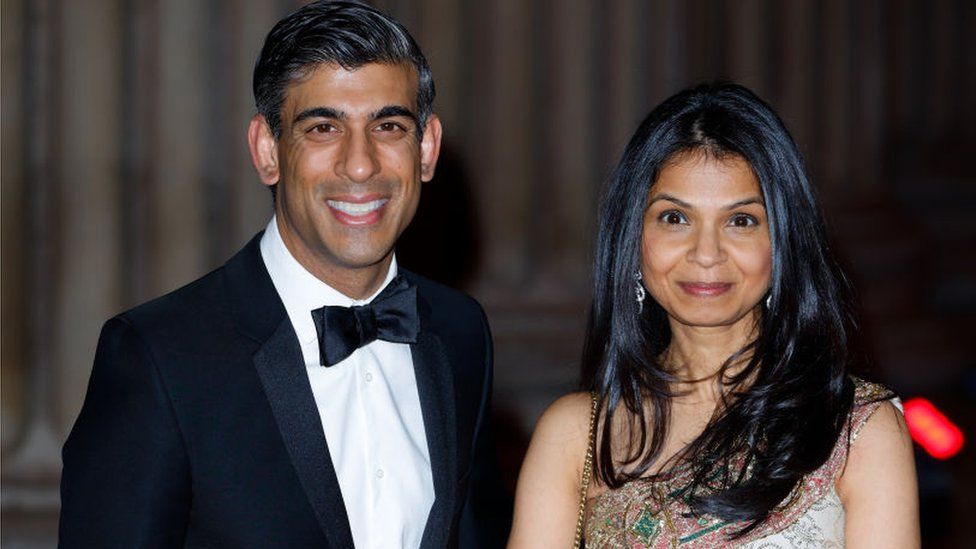
Akshata Murty opted to claim non-dom status, meaning she does not have to pay UK tax on her overseas income.
Critics estimate she would have avoided about £4.5m in UK tax last year.
The non-dom scheme is legal but Labour says it would be “breathtaking hypocrisy” if the chancellor’s wife had reduced her tax bill as he raised taxes for millions of workers.
Responding to the chancellor’s claims that Labour was unfairly smearing his wife, a Labour source told the BBC: “The chancellor would do better to look a little closer to home.
“It’s clear that No 10 are the ones briefing against Rishi Sunak and after his failure to tackle the cost of living crisis you can understand why.”
In an interview with the Sun newspaper, Mr Sunak said he believed he was the victim of a campaign to discredit him, saying: “To smear my wife to get at me is awful.”
But No 10 has rejected newspaper reports that its staff are leaking damaging material about the chancellor to the media, calling the allegations “categorically untrue” and “baseless”.
Ms Murty, an Indian citizen, owns a 0.9% stake in Infosys, the software giant founded by her billionaire father. Her stake fluctuates in value but is estimated to be worth more than £500m.
She receives annual dividend payments on the shares, which last year were reported to be worth £11.6m .
On Thursday, it emerged that Ms Murty pays £30,000 a year to maintain her non-domicile status, meaning she does not pay tax in the UK on her overseas earnings.
It is not known whether she pays tax on her Infosys dividend payments in India or in another jurisdiction.
Under the rules, people can be granted non-dom status if they live in the UK but intend to return home.
Mr Sunak insisted his wife had not broken any rules in his Sun interview.
“Every single penny she earns in the UK she pays UK taxes on… and every penny that she earns internationally, for example in India, she would pay the full taxes on that,” he said.
He said it was unfair to attack his wife when she was a “private citizen”, adding: “I’m an elected politician. So I know what I signed up for.”
Mr Sunak said his wife was domiciled in India and would eventually return there to care for her parents as they got older.
Labour has written to the chancellor to ask if his wife paid all foreign tax in India or in a tax haven such as the Cayman Islands. The party has also asked the chancellor if he benefits from his wife’s tax arrangements.
The Liberal Democrats have urged Mr Sunak to ban the partners of ministers from claiming non-dom status, calling it a “loophole”.
A non-dom is a UK resident who declares their permanent home, or domicile, outside of the UK.
A domicile is usually the country his or her father considered his permanent home when they were born, or it may be the place overseas where somebody has moved to with no intention of returning.
For proof to the tax authority, non-doms have to provide evidence about their background, lifestyle and future intentions, such as where they own property or intend to be buried.
Those who have the status must still pay UK tax on UK earnings but do not need to pay UK tax on foreign income. They can give up their non-dom status at any time by stating on a tax return that they intend to live in the UK and wish to be considered British for tax purposes.
Ms Murty has chosen to be domiciled in India via her father, the billionaire Narayana Murty, which means she doesn’t need to pay taxes in the UK on dividends she receives from her stake in his company.
The fee for non-dom status rises to £60,000 a year when a person has been in the UK for at least 12 of the previous 14 years.
And anyone living in the UK for 15 years automatically loses the status.
Ms Murty, who married Mr Sunak in 2009, has declined to say when her non-dom status began.
“India does not allow its citizens to hold the citizenship of another country simultaneously,” Ms Murty’s spokeswoman said. “So, according to British law, Ms Murty is treated as non-domiciled for UK tax purposes.
But tax experts have questioned Ms Murty’s statement, suggesting UK non-dom status is a “choice” and something people can give up if they want to.






